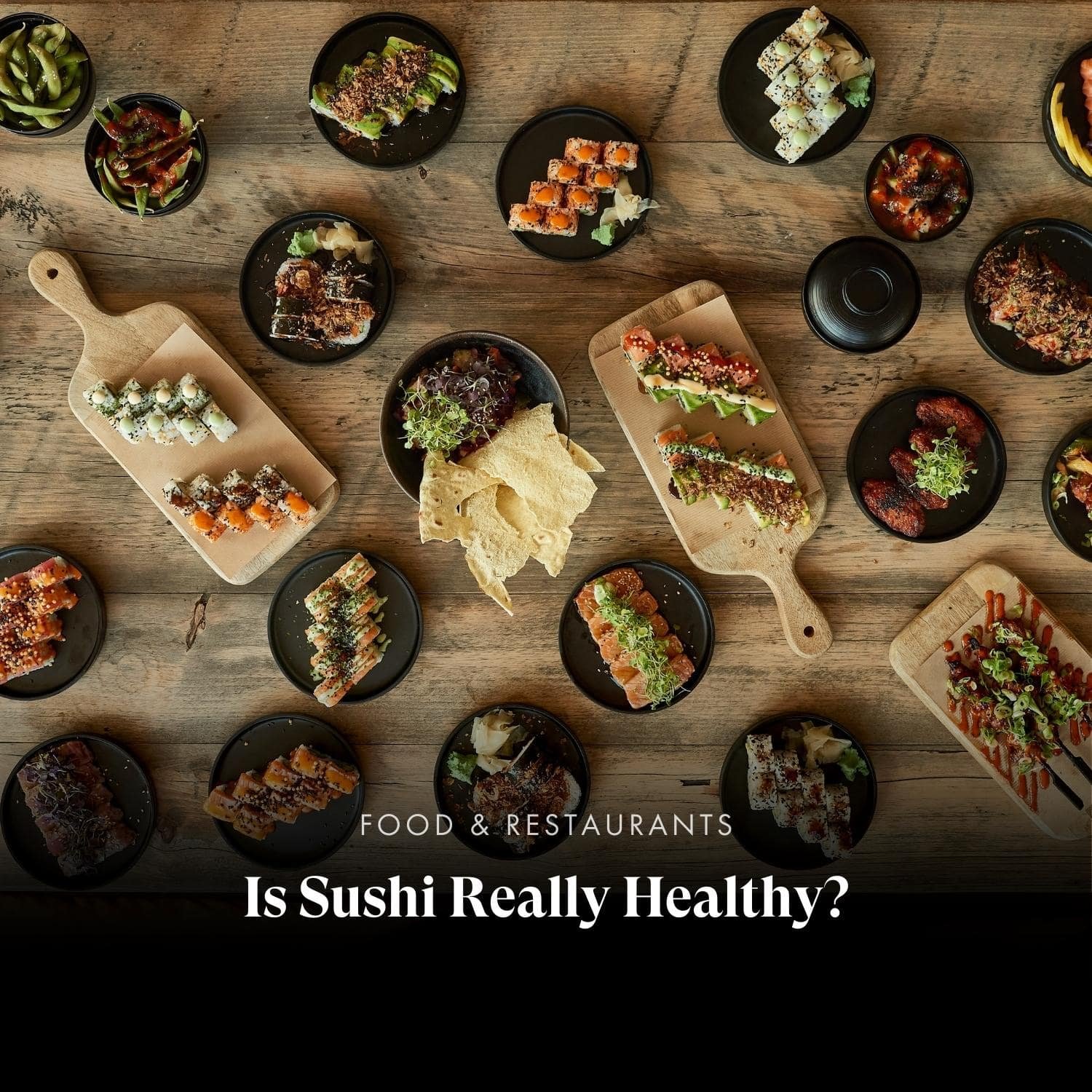The Health Benefits of Sushi: Is The Japanese Cuisine Really Healthy?
Is sushi really healthy? As with most things in life, it depends, but the majority of nutritionists could probably agree that sushi is mostly healthy for most people. But before we talk, relatively loosely in a scientific sense (see The Hoff’s quote below) about the benefits of sushi, we think its best to highlight a few things.
“I think that without sushi there would be no David Hasselhoff because sushi is like the perfect way of describing the insides of David Hasselhoff. He is like a protein, clean and easy. That’s how I feel about myself.”
Firstly, anyone who has an interest in diet and nutrition (including myself) knows that it is not an ‘exact science’ (science rarely is). It’s often contradictory (sometimes respected scientists in the same field can have opposing views) with new evidence and studies changing the consensus. This is the scientific method after all, but it can leave many people feeling that none of the ‘science’ can be trusted. Secondly, the nutritional benefits of food is not the same for everyone. In fact there is an infinite numbers of variables which affect what food is healthy for someone, so there is no way to say for sure that a sushi is beneficial at a individual level.
We are already sold on the taste and experience benefits of sushi here at Netil360 Rooftop. After all we started our very own sushi restaurant and we’re on a mission to shout it from the rooftops (so to speak)
The health benefits of sushi: A nutritional powerhouse
Not just a tasty and delicious Japanese cuisine, sushi is also packed with a whole host of health benefits that can significantly improve your well-being.
From reducing the risk of heart disease to preventing cancer, sushi is a powerhouse of nutrients that can do wonders for your body. Whether you are a sushi enthusiast or a health-conscious individual looking for new ways to improve your diet, this article shows you how sushi can help you stay healthy and happy, so you can chow down on that sumptuous sashimi, killer kimchi and wicked wasabi guilt free.
Uramaki from Netil360 Rooftop sushi restaurant
Nutrient-rich ingredients: A recipe for healthy eating
Sushi is a nutrient-dense food that is low in calories and high in vitamins, minerals, and omega-3 fatty acids. The nutritional value of sushi varies depending on the ingredients used. Our sushi at Netil360 Japanese restaurant includes all of the following ingredients so check out the benefits below.
Rice
Sushi rice is short-grain white rice that is seasoned with vinegar, sugar, and salt. It is a good source of carbohydrates, which provide energy to the body.
Fish
Sushi rolls are typically made with fresh fish, such as salmon, tuna, and mackerel. According to the NHS, these fish are rich long-chain in omega-3 fatty acids, which are essential for brain function, heart health, and reducing inflammation in the body.
“Eating fish once or twice a week may also reduce the risk of stroke, depression, Alzheimer’s disease, and other chronic conditions.”
Raji CA, Erikson KI, Lopez OL, Kuller LH, Gach HM, Thompson PM, Riverol M, Becker JT. Regular fish consumption and age-related brain gray matter loss. Am J. of Prev Med. 2014; 47(4):444-51
Vegetables
Sushi rolls often include vegetables like avocado, cucumber, and carrots, which are high in vitamins and minerals.
Nori (seaweed)
Sushi rolls are wrapped in nori, a type of seaweed that is high in iodine, which is important for thyroid function.
Potential health benefits of sushi
Weight Loss
If you're trying to lose weight, sushi can be a great addition to your diet. Sushi is low in calories and high in protein, which can help you feel full and satisfied. In addition, the omega-3 fatty acids in fish can help boost your metabolism and reduce inflammation in the body, which can aid in weight loss. However, it's important to choose sushi rolls that are low in calories and avoid those that are loaded with mayonnaise or fried ingredients.
Heart Health
Sushi can also good for your heart health. The omega-3 fatty acids in fish can help reduce the risk of heart disease by lowering blood pressure, reducing inflammation, and decreasing triglycerides in the blood. In addition, the nori used in sushi contains taurine, an amino acid that has been shown to lower cholesterol levels in the body.
Brain Function
The omega-3 fatty acids in fish are also important for brain function. They can improve memory, concentration, and cognitive function. In addition, the rice used in sushi is high in carbohydrates, which provide the brain with energy to function properly.
Immune System
Sushi can also boost your immune system. The fish used in sushi is high in vitamin D, which is important for immune function and bone health. In addition, the nori used in sushi is rich in antioxidants, which can help protect the body from damage caused by free radicals.
Digestive Health
The vinegar used in sushi rice is good for your digestive health. It can help improve the absorption of nutrients, reduce inflammation in the gut, and promote the growth of beneficial bacteria in the gut. In addition, the vegetables used in sushi are high in fibre, which can help regulate bowel movements and promote digestive health.
Futomaki large sushi rolls with salmon and cucumber at Netil360 sushi restaurant - Many sushi dishes use seaweed which is a great source of iodine
How to choose healthy sushi options
While sushi is generally a healthy food, not all sushi rolls are created equally. To choose healthy sushi options, follow these tips:
Choose rolls that are made with fresh fish and vegetables.
Avoid rolls that are deep-fried or loaded with mayonnaise (although we have some tasty options on our menu if you do want these…).
Choose rolls that are low in calories and high in protein.
Avoid rolls that are high in sodium or sugar.
More of you sushi health questions answered here.
-
Raw fish used in sushi should be sourced from reputable suppliers and properly handled to ensure safety. Rest assured, our fish at Netil360 is always freshly sourced and our restaurant has very high standards of food safety and hygiene practices.
-
Yes, we have plenty of vegetarian sushi options available. See our menu for details where we mark dietary information.
-
To ensure a balanced meal, include a variety of sushi options. Choose rolls with a mix of vegetables, lean proteins, and healthy fats. Adding a healthy side like our Wakame Chopped Salad or Edamame Beans can provide additional nutrients. See our menu here.





